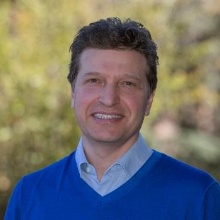Daniel M. Tartakovsky, Professor in Energy Science and Engineering Department, Institute for Computational Mathematics and Engineering, and Bio-X at Stanford University, was honored as Argyris Professor 2023. He is a leading researcher in applied computational mathematics, environmental fluid mechanics and, recently, biomedical modelling. With his background as applied mathematician, he works in an exemplary interdisciplinary fashion in environmental, engineering and life sciences.
Tartakovsky's research focuses, among others, on mathematical modelling and simulations for engineered geosystems such as energy and gas storage in the subsurface, geothermal energy, reactive mixing and transport in porous media, blood flow and perfusion, energy materials such as lithium-ion batteries, and design of nano-porous materials. Methodologically, he investigates uncertainty quantification, inverse modelling and data assimilation, multi-scale modelling, stochastic differential equations and hybrid (machine-learning and PDEs) modelling.
"I foresee a deep interaction with many SimTech project visions", explained Wolfgang Nowak, Spokesperson of SimTech, in the nomination of Professor Tartakovsky. "He is an outstanding member of the community, a very sharp discussion partner and a quick, analytical thinker with vast overview on many topics in the strategically important area of data-integrated simulation sciences. This makes him a perfect and strategically highly valuable candidate for the Argyris Visiting Professorship, and I am highly confident that new collaborations will arise", said Wolfgang Nowak.
We are very pleased that he accepted our invitation and gave the Argyris Lecture 2023 in the course of SimTech2023 on 5 October 2023.
Argyris Lecture 2023: Use and Abuse of Machine Learning in Scientific Discovery
Abstract: My talk focuses on the limitations and potential of deep learning in the context of science-based predictions of dynamic phenomena. In this context, neural networks (NNs) are often used as surrogates or emulators of partial differential equations (PDEs) that describe the dynamics of complex systems. A virtually negligible computational cost of such surrogates renders them an attractive tool for ensemble-based computation, which requires a large number of repeated PDE solves. Since the latter are also needed to generate sufficient data for NN training, the usefulness of NN-based surrogates hinges on the balance between the training cost and the computational gain stemming from their deployment. We rely on multi-fidelity simulations to reduce the cost of data generation for subsequent training of a deep convolutional NN (CNN) using transfer learning. High- and low-fidelity images are generated by solving PDEs on fine and coarse meshes, respectively. We use theoretical results for multilevel Monte Carlo to guide our choice of the numbers of images of each kind. We demonstrate the performance of this multi-fidelity training strategy on the problem of estimation of the distribution of a quantity of interest, whose dynamics is governed by a system of nonlinear PDEs (parabolic PDEs of multi-phase flow in heterogeneous porous media) with uncertain/random parameters. Our numerical experiments demonstrate that a mixture of a comparatively large number of low-fidelity data and smaller numbers of high- and low-fidelity data provides an optimal balance of computational speed-up and prediction accuracy.
Daniel M. Tartakovsky
Dr. Tartakovsky is a Professor in Energy Science and Engineering Department, Institute for Computational Mathematics and Engineering, and Bio-X at Stanford University. Prior to joining Stanford, he was a Staff Scientist in Theoretical Division at Los Alamos National Laboratory (1996-2005) and Professor of Mechanical and Aerospace Engineering at University of California San Diego (2005-2015). His research interests include data-driven modeling and simulations, parameter estimation, and uncertainty quantification, with applications ranging from electrochemical energy storage to biomedical engineering.


